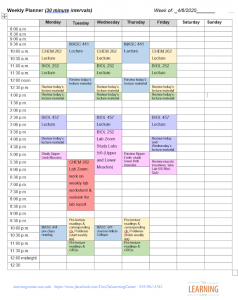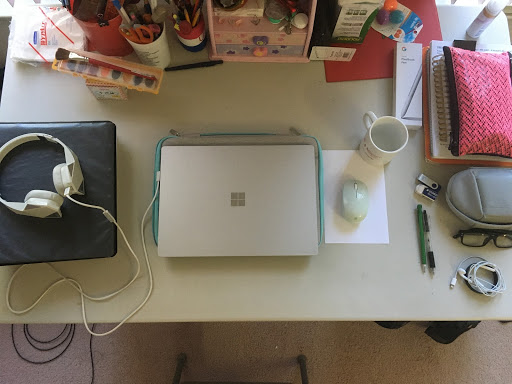Tackling Online Classes
By a Learning Center Peer Tutor
To say the least, the transition to remote learning this past spring was anything but ideal for me. Amidst the strange times, focus went right out the window, and I did what I could to scrape by in my classes until the end of the semester. When planning for the fall semester, I was less than thrilled to discover the majority of my classes would be completely online.
So, after hours of pacing around my house, trying to come up with a fool-proof plan to ace my online courses this time, I’ve come to the unfortunate conclusion that such a plan doesn’t actually exist. However, by reflecting on the past semester, I did come up with a couple of strategies that helped me regain my focus.
- Sticking to a schedule of “attending” lectures and studying. Pre-quarantine, my tight schedule of classes, lab work, music lessons, lacrosse practices, and volunteering kept me scrambling from one thing to the next. Although hectic, it turns out this busy schedule actually kept me on task by focusing my studying within the limited time I did have. Suddenly with nowhere to go, I would sit in front of my laptop unfocused, staring at the screen. A 1 hour pre-recorded lecture turned into a multi-hour ordeal of watching and rewatching, restarting the lecture whenever I lost focus (which was often).
To combat this, I started viewing lectures solely during the stated class times, even for asynchronous courses. When I sat down to “attend” the lecture I would watch it all the way through. I made it a point to not stop or rewind even if I missed something my professor said. Instead, I reserved going back through the recording for my designated study times, which I started scheduling out using the Learning Center’s 30-minute interval weekly planner. By creating a schedule and sticking to it, I was mimicking the busyness of my “normal life”, which helped bring structure back into my day. This allowed me to make the most of the shorter, more focused time that I spent studying.
Here’s an example of my weekly schedule for lecture/study times back during the spring semester! - Dress for Success! As cheesy as it may sound, I found that my mindset had a lot to do with my ability to concentrate. At first, online learning seemed like the perfect opportunity to stay in my pajamas all day and leisurely “go to class” from the comforts of my home. However, once I actually started doing this, my brain went from “thinking” to “relaxing”. Feeling lazy, I caught myself nearly falling asleep when viewing the lectures, despite getting sufficient rest the night before. So instead, I started following my typical morning routine again, getting dressed for class as if I were going to actually leave the house. Once I did this, I felt alert and was able to retain more of the information presented in lecture.
- Set up a quiet workspace, free of distraction. Learning remotely with 3 of my siblings, my parents, and grandma all at home together was a lot easier said than done. For the first week of online classes, I would be in a different part of the house each day – living room, kitchen, basement (I was even sitting outside at one point!) – wherever the quietest place was that day. With the constant moving around, I was feeling very scatter-brained before I even sat down for class.
After a week of working like this, I finally took the time to clear a personal workspace in my shared bedroom. With my physical environment newly organized, I now had a distraction-free zone where I could focus on online learning.

If I’m being honest, there are definitely some weeks that I don’t stick to my schedule of study times or days when I simply roll out of bed to attend lectures in my pajamas. Overall, though, these strategies have reshaped my mindset into a more focused one. They compensate for the absence of structure that physically going to class used to provide, and they make online classes easier for me to tackle.
This blog showcases the perspectives of UNC Chapel Hill community members learning and writing online. If you want to talk to a Writing and Learning Center coach about implementing strategies described in the blog, make an appointment with a writing coach or an academic coach today. Have an idea for a blog post about how you are learning and writing remotely? Contact us here.

